Faculty of Health Sciences
Faculty of Health Sciences
Department of Medical Engineering
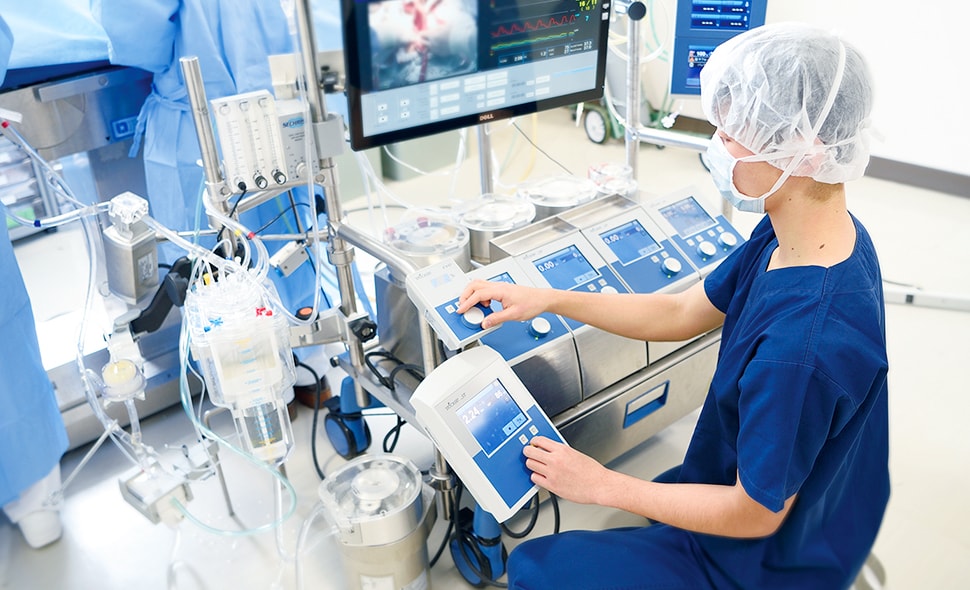
Producing the specialist for life – support, medical equipments as the highly specialized medical professionals
The Department produces the professionals with basic knowledge in medicine and engineering, who can operate and maintain the medical equipments used in clinical settings such as life – support system and surgical devices. The Department welcomes the person who can actively participate into the team medical service.
- Importance of Education and Manners as Medical Professionals
- The Department regards highly the value of education and manners. Education implies the process of increasing the knowledge and humanity through the Department; Manner implies the measure to acquire the way to adapt to the social life through daily habits, both of which are regarded as the most important for the medical professionals.
- Learning the Well Balanced Knowledge in Medical Science and Engineering
- The knowledge of the machine is not enough to operate the medical apparatus in clinical settings. The Department will supply the basic knowledge and skills from the beginning to be the capable medical engineers.
- Close Follow up of the Students by the Academic Staff
- The Department supplies the small group teaching for the students who can acquire the basic knowledge in medicine and engineering then the advanced knowledge in medical engineering. The number of academic staff per student is 9.8 (as of 2013). The close relationship between the student and the staff is a strong support for the national examination and also for job opportunity.
- Clinical Practice and Thesis Work Applicable to Highly Developing Medicine
- The students will have close contact with the front line professionals in the clinical practice, which will enable to clarify the meaning of the knowledge in the class. It is important for the medical engineers to ask why and to search for the cause, which will be acquired through the thesis work.
Endorsed Qualification
- Clinical Engineering / Medical Engineering
- ME Technologist (Class 1 & 2)
- Medical Information and Device Communicator (MDIC)
- Medical Information Technologist
- Basic Information Technologist
- Bachelor (Clinical Engineering)
Possible Occupational Opportunities
- Various Departments in Hospitals (Operational Facility, Intensive Care Unit, Blood Dialysis Center, Emergency, Cardiac Catheter Management, Central Facilities for Medical Apparatus, Medical Safety Department, etc.
- Clinics (Blood Dialysis Clinics)
- Highly Advanced Medical Center
- Companies in Medical and Pharmaceutical Science
- National Hospitals, etc.
Brief Description of the Course
The 1st year
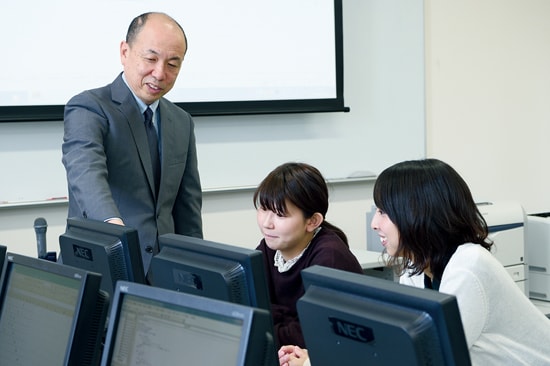
The students learn basic subjects such as mathematics, physics, informational science, psychology, English and others to acquire the rich liberal arts.
- Basic Subjects
- Health Science, Informational Science 1, Basic Mathematics 1 & 2, Basic Physics 1 & 2, Biochemistry, Modern Science and Technology, English 1 & 2, Communication Theory, etc.
- Basic Professional Subjects
- Anatomy 1 & 2, Physiology 1 & 2, Public Health, Practice in Basic Mathematics 1 & 2, Practice in Basic Physics 1 & 2, Electric Engineering 1, etc.
- Professional Subjects
- Introduction to Clinical Engineering, etc.
The 2nd year
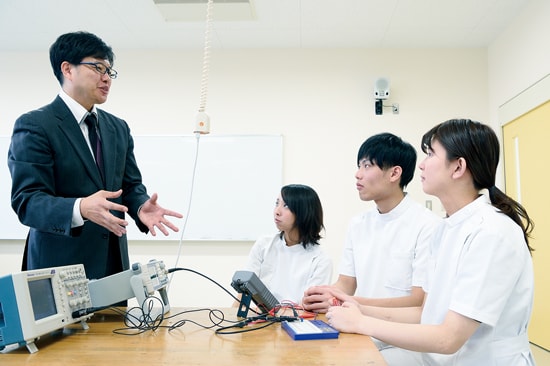
The students learn the basic principles of medical equipments through well-balanced lectures in medical sciences and engineering. The second year is the bridge between the basic learning to professional learning.
- Basic Subjects
- Medical English 1 & 2, Japanese Literary, Law in Daily Life, Medical Ethics, Human Science, etc.
- Basic Professional Subjects
- Practice in Physiology, Introduction to Medicine, Introduction to Pathology, Clinical Biochemistry, Infectious Disease & Immunology, Metabolic Nutrition, Clinical Pharmacology, Emergency Medicine, Introduction to Nursing, Mathematics, Physics, Practice in Mathematics and Physics, Electric Engineering 2, Practice in Electric Engineering, Electronic Engineering 1 & 2, Instrumentation Physics, Mechanical Engineering, Practice in Mechanical Engineering, Systems and Control Engineering, Informational Science 3, Practice in Information Science, etc.
- Professional Subjects
- Biomedical Engineering, Medical Biomedical Processing and Medical Imaging, Clinical Medicine 1, Nephrology & Urology, etc.
The 3rd year
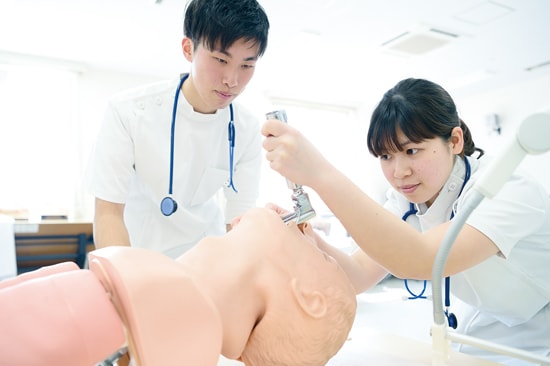
The students learn mainly medical science and engineering. They learn practically the need and usage of various medical equipments including life-sustaining machine.
- Basic Subjects
- Practice in Briefing English Technical Papers, etc
- Basic Professional Subjects
- Practice in Electronic Engineering, Practice in Mechanical Engineering, etc.
- Professional Subjects
- Biomaterials, Artificial Organ, Laws and Regulations Related to Clinical Engineering, Cardiovascular Perfusion Techniques 1 & 2, Mechanical Ventilation, Medical Imaging and Diagnosis, Clinical Medicine 2, Anesthesiology & Intensive Care, Hemodialysis 1 & 2, Medical Treatment Apparatus 1 & 2, Practice in Life-support Systems, Practice in Safety Management of Medical Instruments, Practice in Medical Treatment Apparatus, Practice in Bioinstrumentation, Sym-medical Theory, etc.
The 4th year
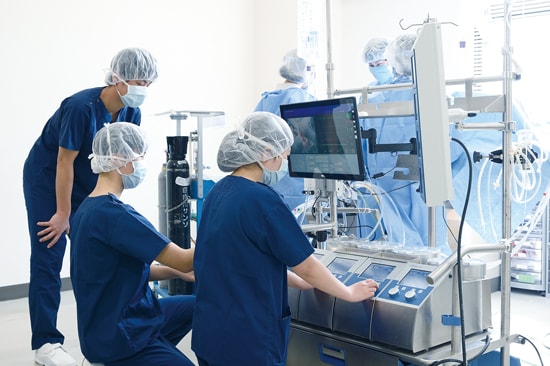
The students will be exposed to the practice in clinical settings to secure the knowledge and skills learned in classes. In research for graduation thesis, the student will tackle the individual topics to be studied to acquire the problem-solving ability.
- Basic Subjects
- Social Welfare, etc.
- Professional Subjects
- Clinical Training 1, 2, 3, & 4, Practice in Clinical Engineering, Research for Graduation Thesis Work, etc.
Message from the Department Director
Message
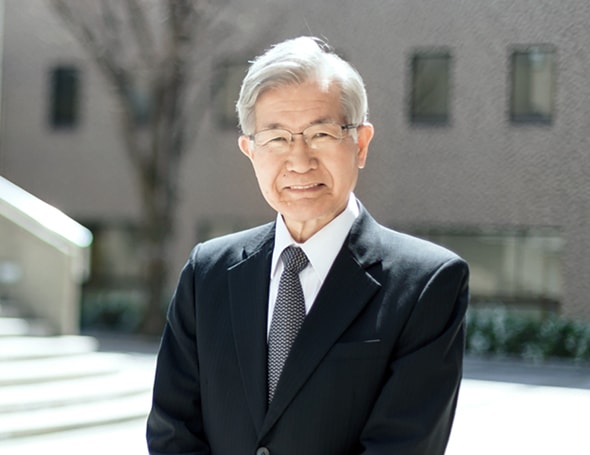
Department DirectorChizuka IDE
Medical Engineering covers the wide area of medical technology, including cardiovascular catheterization, extracorporeal respiration/circulation, hemodialysis, and so forth. Medical engineers manipulating sophisticated instruments in these fields should have a basic knowledge of both biomedicine and electronic mechanics. Hopefully, applicants for the Medical Engineering Course will have learnt basic physics, mathematics, and biology in high school before coming to our University. Our Department is enjoying a very high ratio of successful applicants in the national qualifying examination of Medical Engineering. We look forward again to having active students join us in our well-equipped Department.
